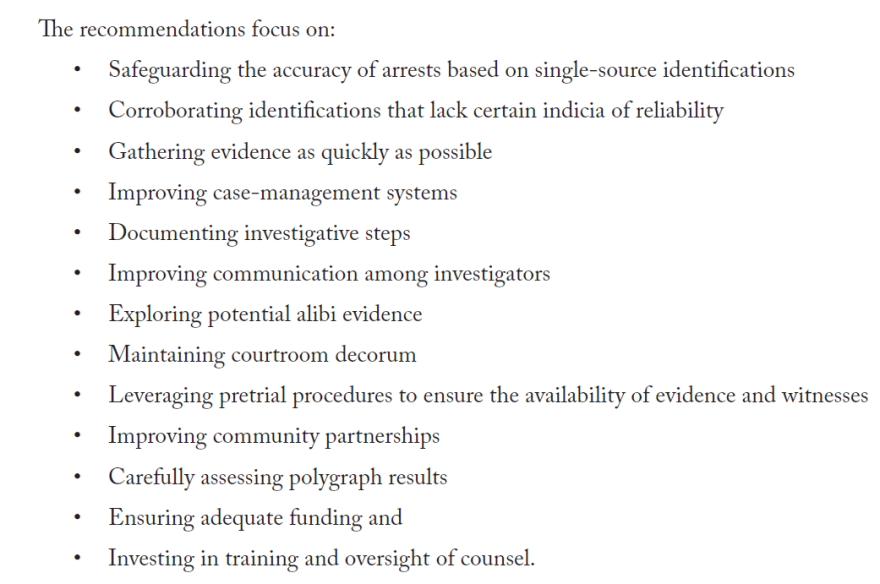- Eric Anderson spent nine years in prison for a crime he didn't commit. It was "a perfect encapsulation of all the things that can go wrong," the leader of Wayne County's Conviction Integrity Unit said.
- A first-of-its-kind report pulled together all the agencies in the criminal justice system that had a role in Anderson's wrongful conviction to analyze where they went off-course.
- Recommendations from the report include better practices for eyewitness identification, improved communication among investigators, and more training for prosecutors.

It’s not unusual now for prosecutors’ offices to have a division called a Conviction Integrity Unit, dedicated to investigating the possibility of wrongful convictions. In Michigan, the one in Wayne County is by far the most prolific.
Now Wayne County is taking things a step further, with an effort that dissects a wrongful conviction bit by bit. It’s called a sentinel event review, and Prosecutor Kym Worthy has said she hopes it’s only the beginning.
A case of misidentification
In 2010, Eric Anderson was a 20-year-old community college student hoping to transfer to Michigan State University. In April, he and a friend went to a club in downtown Detroit, then headed to a Coney Island for something to eat.
As they arrived, a fight was breaking out. Anderson described what happened next on the podcast Wrongfully Yours:
Meanwhile, two people in northwest Detroit were attacked by masked gunmen during an attempted robbery. One of the victims knew Anderson’s ex-girlfriend, who suggested to him that Anderson may have been one of the assailants.
The man became convinced that was true. He found a photo of Anderson on Facebook, took it to police, and ID'd him.
A few days later, the police picked Anderson up. To his surprise, they didn’t treat him like a crime victim. Instead, they interrogated him about a robbery.
“I told him I don't know,” Anderson recalled. “I got shot in downtown Detroit. I can't tell you anything about anything that happened on these streets because I was not there.”
“I walk inside the restaurant, and I took 2 or 3 steps inside the establishment. And I was shot in my left foot.”
This set off a chain of events that led to Anderson being convicted and sentenced to at least 15 years in prison. He served nine years before he was finally exonerated in 2019.
Now Anderson’s case has resurfaced — this time, as a cautionary tale and learning opportunity. A new report from the Quattrone Center at the University of Pennsylvania Law School lays out what went wrong. (You can read the full report, along with its recommendations, here).
That type of document is known in criminal justice lingo as a "sentinel event report," and, in Anderson's case, it details many more things that went wrong across the entirety of the justice system.
Valerie Newman, head of Wayne County’s Conviction Integrity Unit, said Anderson's case was selected for the county's first sentinel event report for a specific reason.
It's now well understood that eyewitness testimony is often unreliable. And that’s especially true when a case relies on just one eyewitness. “One of the reasons we chose this case was because it is kind of a perfect encapsulation of all the things that can go wrong in terms of an identification case,” said Newman, who’s led Wayne County’s Conviction Integrity Unit since it launched in 2018.

But Newman said they also picked this case for another reason. Wrongful convictions can sometimes involve corruption or malfeasance, but in Anderson’s case, Newman said, it was more like the Swiss cheese metaphor, where holes in different parts of the system aligned in all the wrong ways.
“Nobody maliciously did anything wrong here,” she said. “But what can we do better? What can the police do better? What can the prosecutor's office do better so that we are slowing this train down?”
A “blame-free” environment
Worthy, the Wayne County Prosecutor, said that when she discovered the idea of a sentinel review, she was “like a dog with a bone because I really wanted to see this happen.”
“To my knowledge, this is the first time a sentinel review on a criminal case has been done in the state of Michigan,” Worthy added. “There's very few of them that have been done around the country. It's a fairly new concept.”
Worthy said getting all the stakeholders onboard with this effort was tough at first.
And getting everyone in the same room for the sole purpose of digging into their past mistakes?
“I'm not going to lie,” Worthy said. “It was a little contentious at first, but we got past that fairly quickly.” She attributed that to the “blame-free environment” the Quattrone Center facilitator fostered.
Worthy said the report is a way to identify the patterns that often underlie wrongful convictions, and take action to correct them.
“I'll just say the use of informants is one of” the problematic patterns, Worthy said.
She said her office has already started doing that.
“There are a couple of officers whose names appear more than others, and we're looking at that as well.”

Detroit Police also participated in the review. Current Chief Todd Bettison said that looking back, he finds Anderson’s conviction “mind-boggling” and “egregious.”
But Bettison is confident nothing like it could happen now. There are multiple reasons for that, including the department’s updated and streamlined CompStat system. That’s where supervisors can closely track a case’s progress, all the way up through the chain of command.
“We look at individual cases and case notes of the detectives, to ensure that they're updating [them], and that they're following the policies and the procedures that we would expect,” Bettison said.
But Bettison said the biggest reason a wrongful conviction like Anderson's can't happen now is the explosion in surveillance technology since 2010. “There are so many opportunities where the technology and the surveillance will actually vindicate you, will save you,” he said.
The people involved
Tracey Brame agreed that what happened to Anderson is unlikely to happen today. She’s the director of Cooley Law School’s Innocence Project, which also participated in the review process.
But Brame said the case highlights some ongoing, stubborn problems. For example: “Sometimes the investigators don't follow other leads because they now have a narrative that they're trying to fit things into. And I think a lot of that came out in Eric’s case.”
And Brame noted that’s because behind all the new technology, policies, and systems, there are still people. And people have biases, or simply make mistakes. “We have to make sure that the people involved are staying ever-vigilant, and never get to the point where they don't believe it can happen,” she said.
Worthy said Wayne County isn’t the only one in Michigan with these kinds of criminal justice issues — but it’s the one tackling them most aggressively. She said she hopes to do another sentinel review with a different wrongful conviction case, perhaps more than one.
As for Eric Anderson: after his release he co-founded the Organization of Exonerees, which supports people who are wrongfully convicted.
“He and the guys show up just about every time someone is coming home,” Brame said. “They show up at the courthouse to welcome folks home, support them in those first days and months as they're trying to get re-acclimated. I've just been very impressed with him as a person.”







